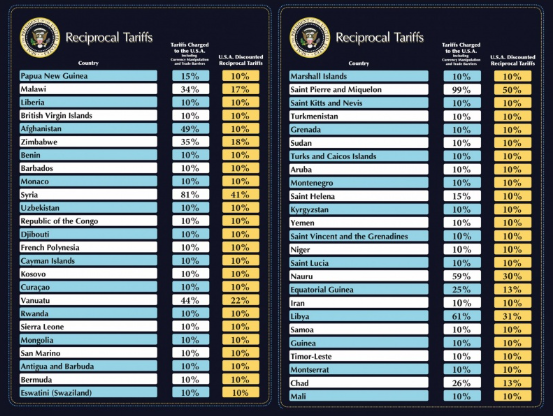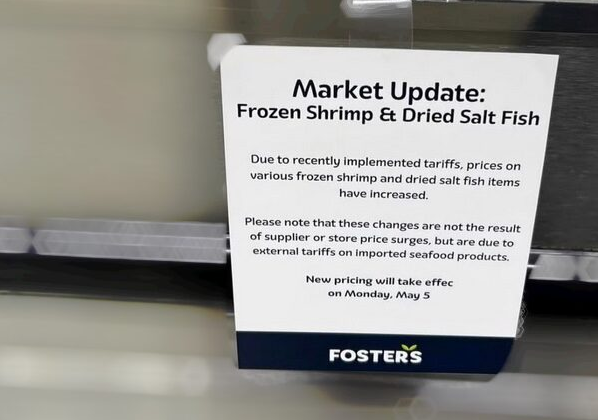Tariffs and their impact on British Overseas Territories
This year, the United States of America (USA) imposed a number of tariffs, impacting international trade and economies of all sizes, causing consequences beyond its borders. Britain’s Overseas Territories, particularly those in the Caribbean and South Atlantic.
NEWS FROM THE OVERSEAS TERRITORIESRESEARCH
This year, the United States of America (USA) imposed a number of tariffs, impacting international trade and economies of all sizes, causing consequences beyond its borders. Britain’s Overseas Territories, particularly those in the Caribbean and South Atlantic. These islands, which rely heavily on trade with the USA, are currently facing the effect of tariffs, highlighting their economic vulnerability


Bermuda
Bermuda, with a trade deficit of 48.6 million in 2025, heavily relies on the USA as its largest trading partner. The territory’s trade is dominated by services, especially in reinsurance, which accounts for 97.4% of Bermuda’s exports into the USA. The 10% tariff increase imposed by the USA has raised concerns in local officials, including Premier David Burt, pointing out that although the direct impact may be small, the higher cost of global supply chains may result in higher pricing for consumers. This situation has resulted in high shipping costs and potential disruptions in logistics, particularly affecting goods imported from the USA, thereby stringing along local businesses and consumers.
Cayman Islands
With 94% of exports and 71.9% of imports originating from the USA in 2024 and an 82.1 million trade deficit. This dependency makes the territory even more vulnerable. Tariffs on sourced parts, which are frequently shipped through the US even if they originate in Europe, are causing local businesses to struggle. Some are diversifying their supply chains to adjust, but the increased cost is a major concern. A survey conducted by The Cayman Compass revealed that spending on food and drinks has doubled since 2015. 25% tariffs on steel and aluminium are also putting pressure on the construction sector, exacerbating the housing crisis. One company reported a 50% rise in aluminium raising costs from its subcontractors. Nearly everything we import to resell is impacted, according to the Cayman Islands Chamber of Commerce. Even goods from Europe and Jamaica are becoming more expensive. With tourism accounting for 40% of employment and 35% of GDP, any reduction in US consumer spending is expected to reduce tourist arrivals, which would further affect the economy.


British Virgin Islands
Similar difficulties affect the British Virgin Islands (BVI), whose biggest import partner is the USA. Due to the territory’s heavy reliance on the US as a transportation route for goods from other countries, shipping delays and higher pricings are common. Almost half of the respondents surveyed reported experiencing the effects of the tariffs as the cost of living rises. The BVI postal services even temporarily suspended parcel shipments to the USA following a new executive order eliminating duty-free exemptions for international parcels.
Anguilla and Montserrat
Anguilla and Montserrat, despite having lower trade volumes, face significant impact. Anguilla, as a net importer of US goods, is struggling with higher costs for essential products. Montserrat, with 67.02% of its imports coming from the USA in 2022, faces similar challenges. Premier Meade has explored alternative sourcing options, meeting with a diplomatic envoy from the Dominican Republic.
Turks and Caicos Islands
With a 59 million trade deficit with the USA, the Turks and Caicos Islands (TCI) are also feeling the effects of the tariffs. Due to logistical efficiencies, shipments are frequently routed through the USA, paying tariffs along the way, which is why the 10% import tariffs are driving up import prices. However, a potential longer-term effect is a reduction in US tourism, which is the backbone of TCI’s economy. Fewer Americans may travel if US tariffs and overall economic uncertainties reduce personal spending, which would hurt TCI.
Falkland Islands
The Falkland Islands are a special case. The USA levied 42% tariffs, one of the highest tariffs on any nation or dependent territory. This decision sent shockwaves throughout the Falklands, an island whose economy is heavily dependent on fishing, which generates 64% of its GDP. Liberal Democrat Ed Davey urged the UK Prime Minister to meet with Governor Alison Blake to discuss the impact on tariffs and ensure the territory’s interests were included in trade talks between the UK and USA (UK-US Economic Prosperity Deal). In May the UK-US Economic Prosperity Deal was announced, which contained a clause stating that the USA would consider reducing tariffs for UK territories, including the Falklands. Finally, in August, a revised tariff system was announced, lowering the rate to 10% for the Falklands, with the effect taking effect on 7 August.
Although the Falklands tariff reduction provides some relief, the broad impact of USA’s trade policies on British Overseas Territories remains a significant concern. It is clear there is heavy reliance on the US for trade, combined with their limited economic diversification, makes them vulnerable to external events. To mitigate these effects, the UK Government could assist Overseas Territories by fostering business links and trade relationships with UK services to reduce import and export prices. Additionally, Overseas Territories should be included within any other trade agreements the UK makes with other countries and entities, such as the EU.
These approaches would not only enhance economic stability but also reduce its dependency on the USA, promoting a long term growth of these territories. Continued local governments and international partners will be crucial in ensuring that the British Overseas Territories can mitigate the challenges presented by global trade.
